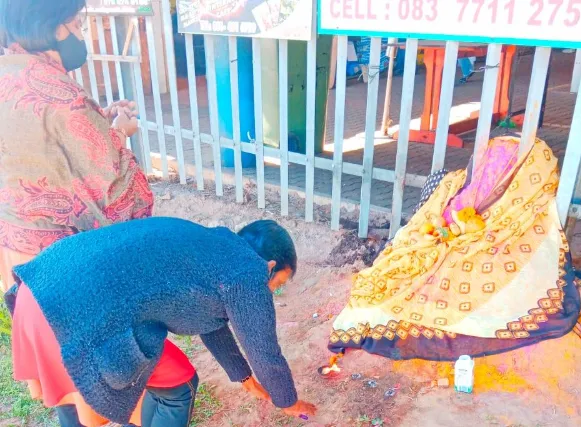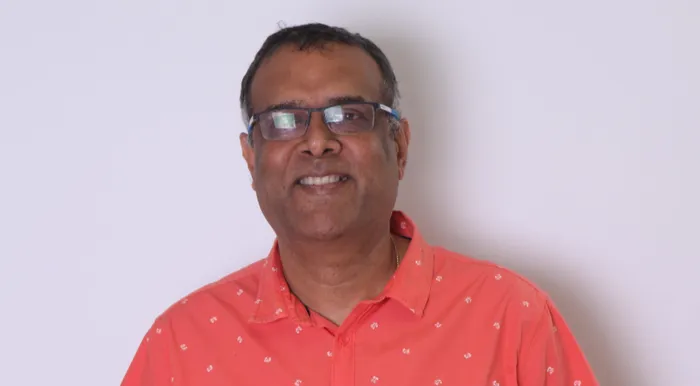Don’t destroy the faith of the economically desperate Fragrance Street market vendors
Sacred

Community members pray at the puthu.
Image: Supplied
THE situation at the Fragrance Street Market in Chatsworth, where Hindu stall owners are being asked by the eThekwini Municipality to remove a sacred puthu and stop performing simple non-invasive rituals, raises significant constitutional, cultural, and administrative concerns.
At a time when more than 40% of the population are unemployed and trying to eke out a living, it’s painful to remove faith-based practices to survive economically in South Africa with its multitude of economic blunders. The practices and beliefs of the vendors are intrinsically linked to the daily activities and should not be prohibited. The sacred puthu is a manifestation that God is close to them and will provide the grace to sustain them in their daily struggles of life.
It is significant to note that Hindus consider human beings to be interconnected with nature and dependent on its forces. Hindus believe that human life is a microcosm of the universe and are part of a larger cosmic system.
A universal principle is that religion cannot be placed in a box, worshipping the divine can occur inside or outdoors; Muslim are allowed prayers to be conducted outdoors and other faiths have breakfast where all religious groups are invited.
Hinduism incorporates nature’s 5 elements, like other religious groups in South Africa including the Shembe and African Zionist Churches groups.
For the Hindu, the reverence for nature, its flora and fauna are part of a teaching that inculcates a strong ethical emphasis on the importance of maintaining ecological balance and protecting the environment something so relevant in today’s world, given the disastrous results that climate change is having in various parts of the world.
Prior to 1994, Christianity was South Africa’s unofficial state religion; post-1994 constitutional entrenchment of freedom of religion, conscience, thought and belief marks a clear break with the repressive and the biased policies of the past.
South Africa’s Constitution guarantees the right to freedom of religion, belief, and opinion (section 15), cultural expression (Section 30) and equity and non-discrimination, particularly when it comes to religion or culture (Section 9). The stall owners and patrons argue that the eThekwini Municipality’s actions infringe on these constitutional rights, especially since the puthu is central to certain Hindu religious customs, rituals, and beliefs. The municipality’s position reflects the failure to respect religious plurality and coexistence in a multicultural market space.
The puthu is not just a physical object as it holds deep spiritual meaning for those who worship there. For the traders and the broader community, the puthu functions as a place of healing and prayer and has become a community-supported, organically formed site of devotion.
Removing the puthu may be seen not just as an administrative decision but as an erasure of lived religious experience. The municipality is highly insensitive to give an order to destroy a religious symbol which will hurt the sentiments, faith and belief of the Hindu devotees.
The municipality’s notice to the vendors detailing that religious rituals in public spaces are prohibited without explicit prior permission is perverse. Vendors claim that they have been performing prayers with the market supervisor’s knowledge for over two years. The lack of consistent enforcement or formal communication before this abrupt notice can be construed as being procedurally unfair.
This case is emblematic of the challenges multicultural societies face when managing public spaces shared by diverse communities, as well as the need for sensitive, inclusive governance that balances regulation with the protection of deeply held cultural and religious traditions.
In this respect, the municipal’s disproportionate targeting of Hindu traders is tantamount to indirect discrimination, especially if other religious groups are not subject to similar scrutiny or restrictions. We note that many other cultural and religious practices are carried out in selected areas of the city, under trees and on roadside areas often with no permission. Some communities have designated places of worship in malls and shopping centres including airports. The question begs, why the inconsistency?
When will such selectivity cease? At a time when a community is pursuing an honest livelihood, the municipality, instead of encouraging them to grow their businesses, chooses to subject them to a discrimination that is based on religious practices.
Instead of embracing all religions to create inclusivity and foster community harmony, the municipality is being divisive. To resolve this respectfully and lawfully, constructive dialogue between the municipality and affected traders is essential. This must include legal mediation and/or intervention from equality or human rights commissions to ensure that constitutional rights are upheld. The outcome of the engagement must provide a clear framework for the inclusivity of all religious needs at public markets that are fair and non discriminatory, irrespective of one’s religious beliefs

Pradeep Ramlall
Image: File
Pradeep Ramlall is the secretary of the Hindasa Foundation.
** The views expressed do not necessarily reflect the views of IOL or Independent Media.
Related Topics: